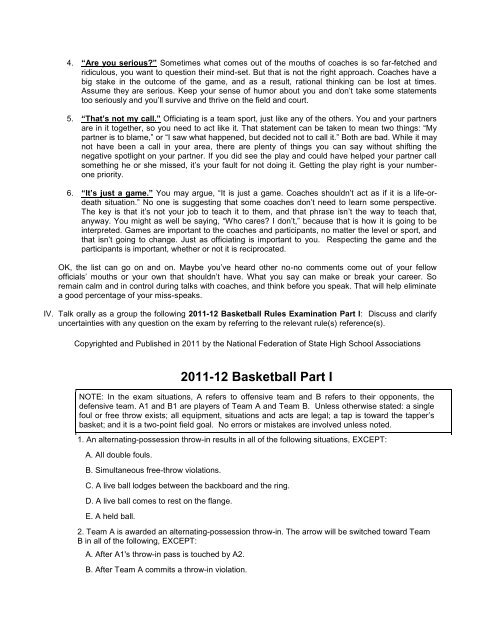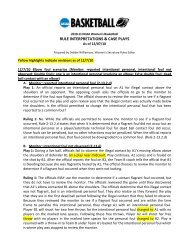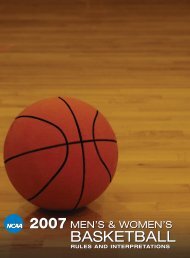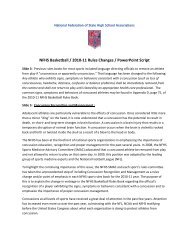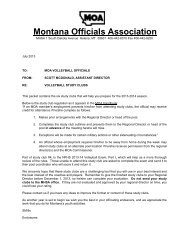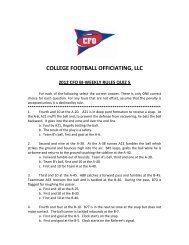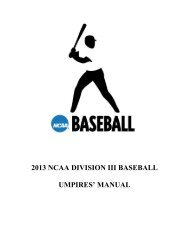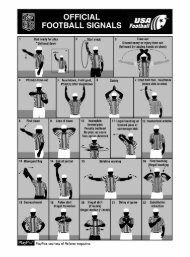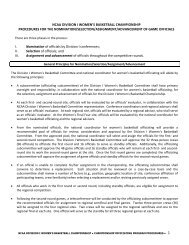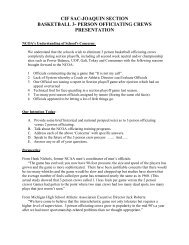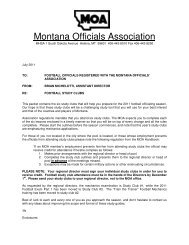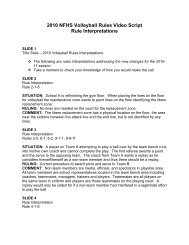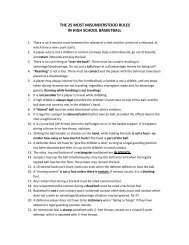MONTANA OFFICIALS ASSOCIATION - MOA - ArbiterSports
MONTANA OFFICIALS ASSOCIATION - MOA - ArbiterSports
MONTANA OFFICIALS ASSOCIATION - MOA - ArbiterSports
Create successful ePaper yourself
Turn your PDF publications into a flip-book with our unique Google optimized e-Paper software.
4. “Are you serious?” Sometimes what comes out of the mouths of coaches is so far-fetched and<br />
ridiculous, you want to question their mind-set. But that is not the right approach. Coaches have a<br />
big stake in the outcome of the game, and as a result, rational thinking can be lost at times.<br />
Assume they are serious. Keep your sense of humor about you and don’t take some statements<br />
too seriously and you’ll survive and thrive on the field and court.<br />
5. “That’s not my call.” Officiating is a team sport, just like any of the others. You and your partners<br />
are in it together, so you need to act like it. That statement can be taken to mean two things: “My<br />
partner is to blame,” or “I saw what happened, but decided not to call it.” Both are bad. While it may<br />
not have been a call in your area, there are plenty of things you can say without shifting the<br />
negative spotlight on your partner. If you did see the play and could have helped your partner call<br />
something he or she missed, it’s your fault for not doing it. Getting the play right is your numberone<br />
priority.<br />
6. “It’s just a game.” You may argue, “It is just a game. Coaches shouldn’t act as if it is a life-ordeath<br />
situation.” No one is suggesting that some coaches don’t need to learn some perspective.<br />
The key is that it’s not your job to teach it to them, and that phrase isn’t the way to teach that,<br />
anyway. You might as well be saying, “Who cares? I don’t,” because that is how it is going to be<br />
interpreted. Games are important to the coaches and participants, no matter the level or sport, and<br />
that isn’t going to change. Just as officiating is important to you. Respecting the game and the<br />
participants is important, whether or not it is reciprocated.<br />
OK, the list can go on and on. Maybe you’ve heard other no-no comments come out of your fellow<br />
officials’ mouths or your own that shouldn’t have. What you say can make or break your career. So<br />
remain calm and in control during talks with coaches, and think before you speak. That will help eliminate<br />
a good percentage of your miss-speaks.<br />
IV. Talk orally as a group the following 2011-12 Basketball Rules Examination Part I: Discuss and clarify<br />
uncertainties with any question on the exam by referring to the relevant rule(s) reference(s).<br />
Copyrighted and Published in 2011 by the National Federation of State High School Associations<br />
2011-12 Basketball Part I<br />
NOTE: In the exam situations, A refers to offensive team and B refers to their opponents, the<br />
defensive team. A1 and B1 are players of Team A and Team B. Unless otherwise stated: a single<br />
foul or free throw exists; all equipment, situations and acts are legal; a tap is toward the tapper’s<br />
basket; and it is a two-point field goal. No errors or mistakes are involved unless noted.<br />
1. An alternating-possession throw-in results in all of the following situations, EXCEPT:<br />
A. All double fouls.<br />
B. Simultaneous free-throw violations.<br />
C. A live ball lodges between the backboard and the ring.<br />
D. A live ball comes to rest on the flange.<br />
E. A held ball.<br />
2. Team A is awarded an alternating-possession throw-in. The arrow will be switched toward Team<br />
B in all of the following, EXCEPT:<br />
A. After A1's throw-in pass is touched by A2.<br />
B. After Team A commits a throw-in violation.


